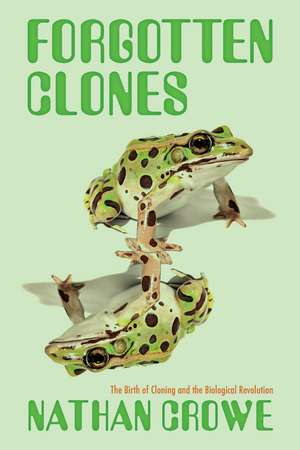Forgotten Clones: The Birth of Cloning and the Biological Revolution
Autor Nathan Croween Limba Engleză Hardback – 7 dec 2021
Preț: 354.82 lei
Nou
Puncte Express: 532
Preț estimativ în valută:
67.90€ • 71.03$ • 56.40£
67.90€ • 71.03$ • 56.40£
Carte disponibilă
Livrare economică 13-27 martie
Livrare express 26 februarie-04 martie pentru 43.12 lei
Preluare comenzi: 021 569.72.76
Specificații
ISBN-13: 9780822946274
ISBN-10: 0822946270
Pagini: 296
Dimensiuni: 152 x 229 x 33 mm
Greutate: 0.64 kg
Ediția:1
Editura: University of Pittsburgh Press
Colecția University of Pittsburgh Press
ISBN-10: 0822946270
Pagini: 296
Dimensiuni: 152 x 229 x 33 mm
Greutate: 0.64 kg
Ediția:1
Editura: University of Pittsburgh Press
Colecția University of Pittsburgh Press
Recenzii
“Goodbye, Dolly. In tracing the forgotten history of human cloning, Crowe leads us along the back roads of some of the most fertile provinces of modern biology: the search for the secret of life; the quest to conquer cancer; the perennial impulse to build a better human; the drive toward a more ethical science. Every chapter is a revelation and a delight.” —Nathaniel Comfort, author of The Science of Human Perfection: How Genes Became the Heart of American Medicine
“Retracing the transition of nuclear transplantation from research method to reproductive technology, Forgotten Clones tells a story central to the emergence of developmental biology as the thriving field we know today. Engaging and intelligent, it will be valued alike by scientists and historians of biology.” —Nicolas Rasmussen, author of Gene Jockeys: Life Science and the Rise of Biotech Enterprise
“The idea of cloning animal life, a term borrowed from horticulture to mean vegetative propagation, burst into public conversations about science in the 1960s. In his fascinating history, Crowe deftly recounts the research on nuclear transplantation that led to this moment and the rise and fall of public interest in the bioethical implications of cloning animals, from frogs to humans.”
—Erika Lorraine Milam, author of Creatures of Cain: The Hunt for Human Nature in Cold War America
“[An] extraordinarily rich history of architecture and acoustic space. . . . Essential.” —CHOICE
“Retracing the transition of nuclear transplantation from research method to reproductive technology, Forgotten Clones tells a story central to the emergence of developmental biology as the thriving field we know today. Engaging and intelligent, it will be valued alike by scientists and historians of biology.” —Nicolas Rasmussen, author of Gene Jockeys: Life Science and the Rise of Biotech Enterprise
“The idea of cloning animal life, a term borrowed from horticulture to mean vegetative propagation, burst into public conversations about science in the 1960s. In his fascinating history, Crowe deftly recounts the research on nuclear transplantation that led to this moment and the rise and fall of public interest in the bioethical implications of cloning animals, from frogs to humans.”
—Erika Lorraine Milam, author of Creatures of Cain: The Hunt for Human Nature in Cold War America
“[An] extraordinarily rich history of architecture and acoustic space. . . . Essential.” —CHOICE
Notă biografică
Nathan Crowe is associate professor of history at the University of North Carolina Wilmington.
